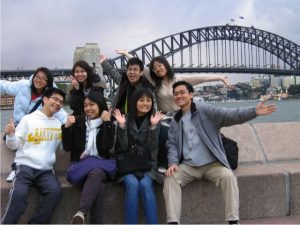The State of Chinese-Australian Relations
At Glover Cottages on Thursday 12 October 2017, AIIA NSW hosted a visiting Chinese delegation to discuss the state of bilateral relations. The Chinese leader was Mr Zhang Junsai, a former Ambassador to Australia, accompanied by Professor Zhou Fangyin, Director of the Centre for China’s Regional Strategies Guangdong Institute for International Strategies; Mr Ding Gong, National Institute of International Strategy, Chinese Academy of Social Sciences; Ms Hou Dongfang Third Secretary Ministry of Foreign Affairs, Beijing and Mr Wang Fanfu of the Chinese Consulate, Sydney.
Hosting them were AIIA NSW President Richard Broinowski, Councillors Jocelyn Chey AM, Colin Chapman and Robert Howard; businessman and National Press Club affiliate Peter Phillips; and Jackson Quok of Linda Jacobson’s research organisation China Matters.
Ambassador Zhang began with Chinese students in Australia. Why were they given a bad time – by the Australian press, members of the public and some politicians? Where did the suspicion come from, especially since bilateral relations were so positive – especially in trade and tourism? Australia had 200,000 Chinese students, but there were almost as many from India and Indonesia. Yet Chinese students seemed to be the focus of a bad press.

AIIA NSW responded by referring to a speech to the Confucius Institute at the University of Adelaide on 9 October by DFAT Secretary Frances Adamson, who urged Australian universities to resist foreign interference, and told international students it was an affront to Australian values to try to silence those in Australia with different views. Foreign students should respectfully engage with new ideas, and universities should remain true to their values and stand up to external influences. Bob Howard pointed out that it was not just Chinese students who tried to suppress ideas, but the hard left also among Australian students. Jocelyn Chey pointed to Australian sensitivity over private Chinese investment in Australian property, politics and research institutions. Much of it was unwarranted, but it persisted nevertheless. Federal politicians were especially resistant to any suggestion that they were influenced by such funding.

Discussion moved on to China’s Belts and Roads initiative. The Australian side thought opportunities had been missed by Canberra, the Australian states and Australian entrepreneurs to get more involved in significant infrastructural projects. Also, that Australian prejudices had inhibited Chinese investment in Australia, particularly in rural development.
AIIA NSW suggested that China’s representatives in Australia should develop a more sophisticated understanding of how the media worked, where prejudices existed among them, and how to develop soft power options. Popular soaps on TV were more effective than boring hard-core propaganda. Allegations of Chinese espionage and pressure on academics to use politically correct definitions of Chinese territories did not go down well with the general populace. A more subtle approach was called for.
Prejudice against Chinese settlers in Australia, it was observed, had existed since the gold rushes of the 1850s, and in some ways this had not changed. But Australia was an immigrant society, and had become much more tolerant of differences than the media gave it credit for. All waves of settlers to Australia had been regarded with intolerance and suspicion, but had survived, integrated and prospered, not least the Chinese. This process would continue. The future of bilateral relations was hopeful provided Canberra did not succumb to pressures from Washington to harden Australia’s position against China.
Report by Richard Broinowski